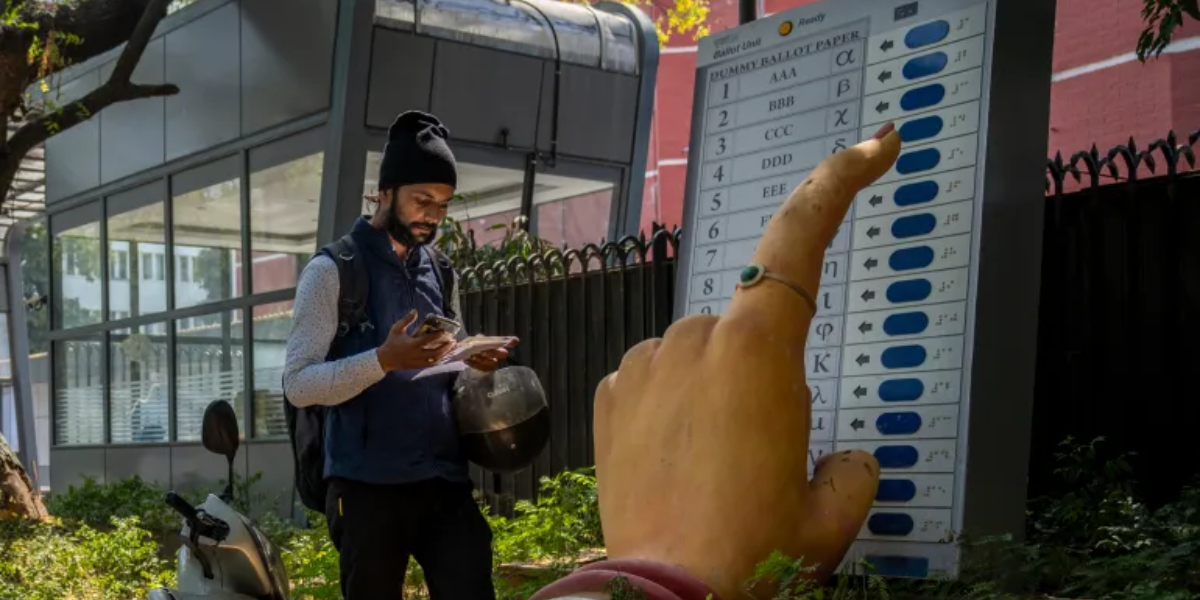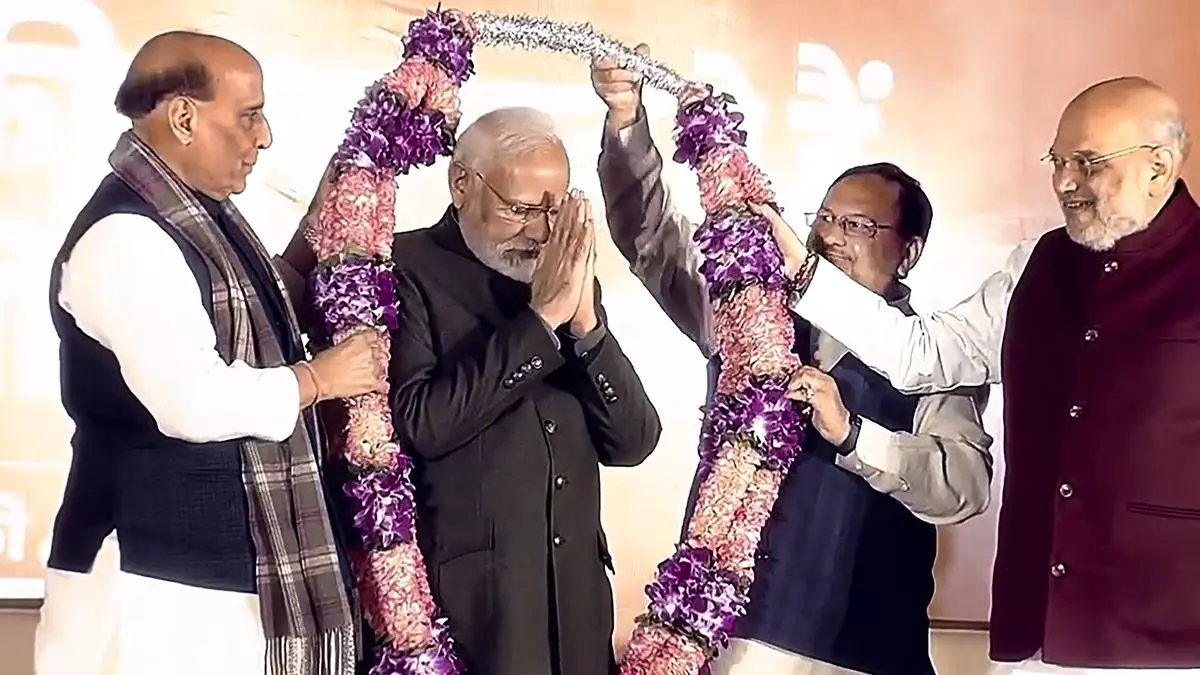This is New Delhi, India. When Rahul Gandhi, the head of the Congress party, launched the election campaign for the main opposition alliance in India in the middle of March, he attacked two targets: Prime Minister Narendra Modi, whom he referred to as the “king,” and the electronic voting machines (EVMs) that are used in the country to cast ballots.
In Mumbai, Gandhi made the statement that “the soul of the king is in the EVM.”
In spite of the fact that many opinion surveys indicate that the party of the prime minister is resoundingly the favorite among voters in many regions of the nation, the allegation is that the machines can be hacked, and that Modi’s Bharatiya Janata Party (BJP) owes its political supremacy over India to that malpractice itself.
This accusation has been about for a while. Electronic voting machines (EVMs) are machines that are not connected to the internet but run on chips that critics say might, in theory, be programmed to record votes in a manner that does not match the buttons that voters push. The Congress and several other opposition parties have previously questioned the reliability of EVMs.
In addition to the Supreme Court of India, the Election Commission of India (ECI), which is responsible for overseeing the voting process in the country, has refuted these charges. Furthermore, there is currently no proof that can definitively support the assertions that have been made.
Gandhi, however, has made the prospect of election fraud a prominent discussion issue in the context of India’s upcoming national elections, which will begin on April 19 and will be conducted over seven drawn-out phases. The leader of the Congress party, who has been on a lengthy march, is asking that India move back to the use of paper votes, which were manually counted in elections up until the late 1990s.
The Supreme Court did not grant that demand the week before last. “Regressive” was the term used by the Election Commission to describe the proposition. Furthermore, the chorus of demands from the Congress and its followers is not going away, despite the fact that opposition parties are in charge of governments in roughly half of the country’s states, which were formed through elections that were also conducted using electronic voting machines. These elections were won by them.
Digvijay Singh, the leader of the Congress party and a former chief minister of Madhya Pradesh, a state located in the center of India, is a persistent advocate for the opposition to the machines. He serves as the leader of a loosely assembled group of critics hailing from the opposition parties and nonprofit organizations in the country who are demanding a return to paper ballots.
A young Dalit academic named Ritu Singh has been making waves on social media platforms such as YouTube, X, and Instagram with her comments, talks, and videos. In these, she asserts that electronic voting machines (EVMs) have put the democratic process in India in jeopardy.
Gregory Ekka, a man who has traditionally voted for the Congress party, expressed his lack of faith in the polls in New Delhi.
“Each and every one of us casts a vote for the Congress, but we are aware of the outcome of our vote. “Until there is electronic voting machines, the Bharatiya Janata Party (BJP) will continue to hold power,” said Ekka, whose tribe hails from the state of Jharkhand in eastern India, which has traditionally voted for the Congress.
In 2013, the Election Commission adopted the Voter Verifiable Paper Audit Trail, also known as the VVPAT. This is a slip of paper that is visible to the voter for seven seconds before it slips into a box that is stored alongside the voting machine. The purpose of this piece of paper is to increase the voter’s trust in the electronic voting machines. A voter has the ability to check on the paper whether or not their ballot has been recorded accurately.
Votes on VVPAT slips were counted at a small number of polling stations across each constituency in 2017, as part of the Election Commission’s decision to conduct a random test to see whether or not the tallies matched those shown by electronic voting machines (EVMs). It is currently being demanded by the Congress and a few other opposition parties that the VVPAT slips be counted at each and every polling place across the nation.
The opposition, however, is incorrect in their assertion that electronic voting machines (EVMs) are not credible, according to senior election officers and independent analysts.
Former Chief Election Commissioner SY Quraishi has expressed his conviction that electronic voting machines (EVMs) cannot be used to manipulate elections in any way. In order to restore faith in the Election Commission as an impartial organization that is responsible for holding elections, he stated that he is in favor of counting VVPAT slips. “It ought to be done, even if it takes additional days to count these VVPAT slips to match the EVM count,” he stated. “Whatever the case may be.”
However, he stated that any political misconduct that can occur during the voting process takes place before the actual voting. In his statement, Quraishi stated that elections can be won or lost prior to the elections.
Prior to each election, the Election Commission distributes advertising that request voters to verify that their names are included on the voter list. This is done to ensure that their names have not been removed by error.
In response to this, Quraishi stated, “If they do not check, how can ECI be blamed?”
Although it is not an easy process, keeping and updating electoral rolls in a manner that is accurate and fair is critical. An officer from the Election Commission who asked to remain anonymous stated that it is of the utmost importance to find and remove names that are either duplicates or names of deceased individuals. The official stated that numerous names had to be erased after the COVID had been completed.
In spite of the fact that the Indian government estimates a far lower number of deaths, the World Health Organization estimates that the pandemic claimed the lives of about four million Indians.
A great number of activists from civil society are concerned that the modification of electoral rolls would be used to eliminate voters who are seen to be inconvenient for the government that is currently in power. Major General Anil Verma, who is now retired, is the head of the Association for Democratic Reforms. This organization was at the forefront of the successful efforts to get the Indian Supreme Court to lift the veil on controversial electoral bonds that are used to fund political parties. “Some of those who would not vote for a political party are weeded out,” Verma said. “The ECI is not doing enough,” I commented.
Tens of millions of Muslim and Dalit voters were purged off the electoral list, according to campaigners, which prompted fears of a suppressed turnout from parts of the population that typically do not vote for Modi or the BJP. The elections are scheduled to take place in 2019.
After the elections for the legislature of the state of Chhattisgarh in central India, which took place in the previous year, Congress leader Praveen Chakravarty wrote in the Indian newspaper Deccan Herald that he had analyzed seven pre-poll surveys, ten exit polls, and two post-poll studies, all of which predicted a higher vote share for the Congress than the BJP. Despite this, the Congress was defeated by a margin of four percentage points.
According to Sanjay Kumar, a professor at the Centre of Study of Developing Society in New Delhi, a “mismatch between survey findings and the final outcome does not mean that the elections have been rigged.” Mr. Kumar made this statement. Since the advent of electronic voting machines, Kumar stated that he has not witnessed any indication of “mass rigging” in elections.



